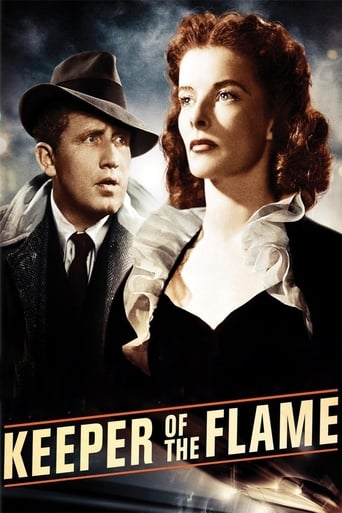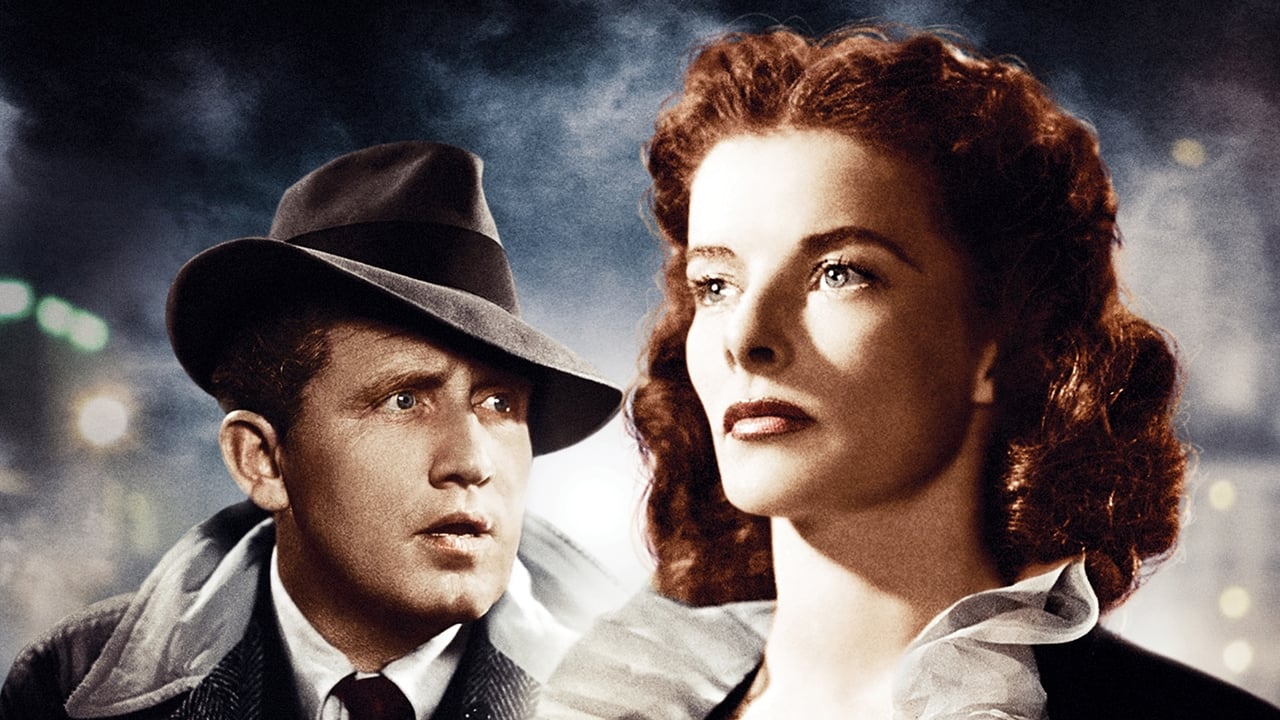DKosty123
My first viewing of this movie got kind of strange. It starts with the death of Richard Forrest. We never meet him, because he is already dead, but the whole film revolves around the people he knew.His widow, Kathryn, is a woman who hides so much knowledge, and keeps everyone in the dark the entire film. Spencer Tracy meets her after Richard's death and his job is to investigate what happened to Richard and why. It is one of Tracy's few roles in a film noir type of setting.George Cukor directs this and throughout there is a lot of mystery and suspense. The music is much like many noir films in that it ramps up whenever something strange happens. Some of the actors in this cast would go on to many other things. Percy Kilbride would go on to be Pa Kettle, but in this film is a cab driver giving passenger Tracy knowledge to chew on about the people he is investigating. Richard Whorf would go on to be a television director doing a lot of Paul Hennings classic sitcoms of the 1960's. Darryl Hickman, Dwayne Hickman's older brother and the more serious actor of the two is one on those conspiring to keep Tracy in the dark. The most haunting thing about this is a sequence later in the film. Tracy catches up with Hepburn trying to destroy the evidence he is not supposed to see.It seems Richard Forrest, the dead hero, had gone from super patriot to evil sympathizer when he died. He has stashed money, papers and plans to pit groups against each other and use each groups hate to divide and conquer them. While this film is referring to Facists and Nazis, the themes and the group that the plans were designed for using each groups hate to isolate and conquer it sounds just like politics today. As Hepburn tells all to Tracy, it sounds too spooky to believe how much Nazi plans are still being used worldwide. Hepburn's (Mrs. Forrest) speech about all the evil being planned to Tracy is an amazing testament to the ways some things do not change, even after those Nazis are gone.
kols
First saw this as a kid in the 50's and was fascinated and just a little frightened by it. The theme, public vrs private personae, was already well know to me, primarily through Joe McCathy's rise and fall, but also from movies like Meet John Doe and Face in the Crowd, while its tone echoed everything from Ace in the Hole to Dragonwhyck: both dark and manic. I even got the Lindbergh allusion because I'd seen numerous newsreels of Lindbergh's speeches, with their hints of racism and fascism, so different from the quintessential American Individualism of Jimmy Stewart's portrayal. No one's mentioned the reference to Alvin York, perhaps because of Gary Cooper's portrayal of a York who consciously rejected what Lindbergh and Forrest embraced.What frightened me was not the specifics of Forrest's 'secrets', the addiction to power, the attraction to fascism, but the way the movie evoked the darkness that resides, hidden and lurking, in all of our souls and how easily that darkness can be unleashed and amplified through the blindness of hero-worship and projection.Haven't seen it since, not until it was on TMC tonight and I was very curious to see if it was the movie I remembered. For the most part it was and, in ways, was even better. The script, performances and cinematography were flawless, up until the last scene with its intrusion of melodrama and a reverse Deus ex Machina. That scene was totally at odds with rest of the movie, comes close to spoiling the entire movie and I suspect it was edited out of the version I saw as a kid; I certainly didn't remember it.Even so, it's an great movie technically and well worth a single viewing; depending on taste, perhaps a second or third. Just scrap the ending.A footnote: Lindbergh, an honest demagogue, and McCarthy, a crooked demagogue, both failed to become kingmakers largely because, while we may idolize 'heroes' and seek 'heroes' to idolize, we don't trust them and, when it comes down to it, we prefer our several hundreds of millions of versions of messy individualism over the comfort and certainty of any ideology.
vincentlynch-moonoi
I've been waiting years for this to come out on DVD because I always found this film to be particularly intriguing -- and intrigue is what this dark and absorbing film is all about.Robert Forrest had become a national hero when he was killed. Spencer Tracy (playing journalist Stephen O'Malley) decides to write a supportive biography about him, but begins to discover there is something more to the story than the other reporters settled for. Forrest's widow, Katharine Hepburn, at first refuses to meet with O'Malley, but then suddenly accepts his request, but is clearly hiding something. And what is being hidden is a fascist plot to overthrown the American government.Richard Whorf is clearly one of the bad guys here, and is superb. Another wonderful performance is by Darryl Hickman as the young boy who blames himself for Robert Forrest's death.The production standards in this film are superb. It's one of those rare times when you almost prefer that they filmed the entire thing in the studio, even though many scenes take place outdoors. The detail in those forest scenes is remarkable.Quintessential Spencer Tracy in what I feel was one of his best roles. And what made Tracy so good here is that unlike some of his early films, by this point in his career he had learned to be subtle and understate, while reserving his magnificence in "roaring" for select moments when it really mattered. And, Katherine Hepburn is equally marvelous as the widow. The scene where she finally tells Tracy the truth about her dead husband is as good acting as she ever did in a film.The ending of the film comes somewhat suddenly...a practice I generally dislike...but this time works. And, at least in my view, it's a surprise ending.Read the interesting background information about this film (for example from Wikipedia), and you'll find out about it's commercial and critical flop that, over the years has been replaced by fairly high regard by professional movie critics. This movie is a treasure on many levels. Very highly recommended...one of the few films I've given a "9" to.
mark.waltz
Influential investigative reporter Spencer Tracy is assigned to tell the story of the life of a late philanthropist whose sudden death shocks the nation. Having been a very prominent humanitarian, the late man left behind a battery of secrets held tightly by his family, which includes his seemingly devoted widow (Katharine Hepburn) and his reclusive mother (Margaret Wycherly). It is difficult at first for Spencer to get through to Katharine, but once he does, she slowly begins to confide in him. In the process of investigating the man's life, Tracy unconsciously begins assisting his survivors in the various aspects of his life. This brings to light the man's true nature and the revelation that his public reputation was not necessarily what his own family knew about him."Keeper of the Flame" is a sleeper Tracy/Hepburn movie, one of their least famous, but well worth a look. It is also their only drama together other than the western epic "Sea of Grass". In many ways, the dead protagonist of "Keeper of the Flame" is like the dead "Rebecca" of Daphne Du Maurier's novel and the 1940 Hitchcock movie. What everyone around them perceives this person to be is definitely not who they really were, and the revelation of this dead man's true nature comes as a total shock to Tracy who now has to make the choice of how to proceed with his expose on the man's life. Should he reveal the truth and not destroy the legacy the man left behind, or should he keep his mouth shut and keep the legend safe? Also, he has to face the dilemma of Hepburn's role in her husband's demise as well as members of the late man's organization who are desperate to keep their activities quiet. This leaves Hepburn and Tracy in a life-or-death situation that results in an emotional conclusion.It goes without saying that Hepburn and Tracy are excellent. In this, their third pairing, they don't share as much a romantic relationship as they do a kinship of understanding. While it is implied that a romance could loom on the horizon, that isn't the focus of their story. Hepburn's widow is obviously a vital woman whose passion for life has been damaged by the truth, and Tracy's reporter is a man filled with integrity that is threatened by what he finds out and how he has to deal with it. Howard da Silva is excellent as a distant relative who at first seems darkly mysterious, but has noble reasons behind his facade. The wonderful Audrey Christie is great as a reporter pal of Tracy's. Wycherly shines in her brief role as the grieving mother, while stage legend Blanche Yurka is sadly wasted as the Mrs. Danvers like housekeeper that keeps her eye on the mother. There are also some fine moments with young Darryl Hickman as Da Silva's son who takes a shine to Tracy and assists him in meeting Hepburn."Keeper of the Flame" is a film that is still socially relevant today as it warns the viewer to beware of wolves in sheep's clothing. What may seem honest up close may not be. As an examination of a dead man's life, it can also be compared to "Citizen Kane", if not as engrossing because the man never appears on camera. But viewers will be able to identify people in the public eye who may or may not be guilty of manipulating them into believing that they are someone they are not.



 AD
AD



